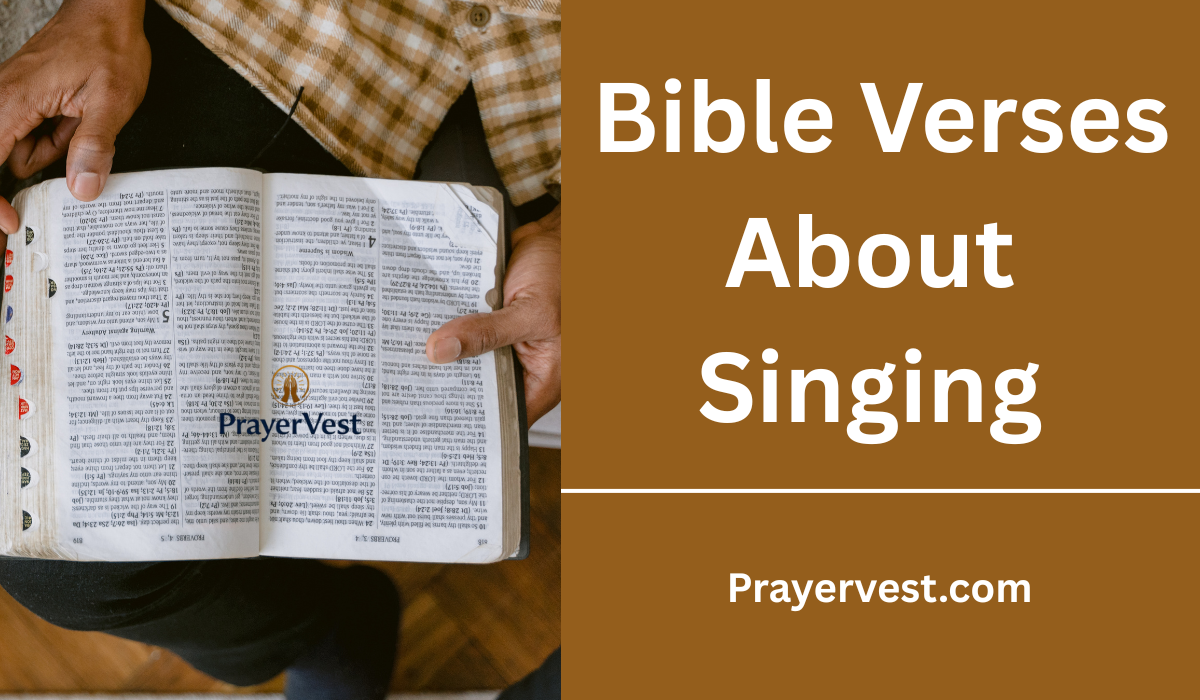The Bible places a strong emphasis on singing as a means of spiritual expression, worship, and praise. Scripture emphasizes the significance of raising one’s voice to God—not simply as a song, but as an act of the heart—from the Psalms to the New Testament.
By expressing appreciation, pleasure, repentance, and devotion via singing, believers can strengthen their faith and establish a closer relationship with God. It is a practice that is both private and public, bringing people closer to God and bringing the faithful together in worship.
Singing is frequently combined with instruments, dance, and celebration throughout the Bible, highlighting the idea that worship involves the body, soul, and spirit. Psalms like Psalm 100 and Psalm 150 exhort believers to sing joyfully, utilizing song to declare the majesty and trustworthiness of God.
Singing is a spiritual activity that celebrates God’s great accomplishments, expresses optimism in difficult times, and reminds us of His promises. It is a vibrant and ageless way for people of all ages and backgrounds to glorify God.


Examining singing-related Bible scriptures provides inspiration, support, and useful advice for strengthening one’s worship practice. These verses tell us that singing is a sincere reaction to God’s love, mercy, and faithfulness; it is more than just an artistic endeavor. Raising our voices in song, whether in public worship or private devotion, deepens our relationship with God, fosters collective faith, and permits the spirit to celebrate. Believers can learn about the transforming power of song as a means of spiritual connection and worship through these verses.
40 Inspiring Bible Verses About Singing (2026)
1. Psalm 95:1
“Come, let us sing for joy to the Lord; let us shout aloud to the Rock of our salvation.”
This verse invites believers to express heartfelt joy through singing, celebrating God’s salvation and unshakable strength. Singing is portrayed as an act of worship, connecting our emotions and spirit to God’s presence. It reminds us that worship through song is both a personal delight and a communal celebration, uniting hearts in gratitude and reverence.
2. Psalm 100:1-2
“Shout for joy to the Lord, all the earth. Worship the Lord with gladness; come before him with joyful songs.”
Here, the psalmist emphasizes the universal call to worship God with gladness and music. Singing is not limited to ritual but is a joyful declaration of God’s greatness and goodness. This passage encourages believers to approach God with lively, heartfelt song, highlighting music as a powerful expression of devotion and celebration.
3. Colossians 3:16
“Let the message of Christ dwell among you richly as you teach and admonish one another with all wisdom through psalms, hymns, and songs from the Spirit, singing to God with gratitude in your hearts.”
Paul instructs the early church to use singing as a tool for teaching, encouragement, and spiritual growth. Music becomes a medium to internalize God’s Word while expressing gratitude and worship. This verse reminds us that singing is not only for personal joy but also serves to uplift and guide the faith of the community.
4. Ephesians 5:19
“Speaking to one another with psalms, hymns, and songs from the Spirit. Sing and make music from your heart to the Lord.”
Singing is described as an authentic expression of the Spirit, originating from a heart fully engaged with God. This passage encourages believers to cultivate a spiritual lifestyle where music reflects inner devotion and praise. It underscores that music in worship is an intimate dialogue with God, expressing both faith and gratitude.
5. Psalm 147:1
“Praise the Lord. How good it is to sing praises to our God, how pleasant and fitting to praise him!”
The psalmist celebrates the intrinsic goodness and pleasure of singing to God. This verse highlights that music is an appropriate, delightful response to God’s character and works. Singing is presented as both a spiritual duty and a joyful expression, affirming the harmonious relationship between worship and heartfelt rejoicing.
6. Psalm 33:3
“Sing to him a new song; play skillfully, and shout for joy.”
This verse encourages creativity and freshness in worship, reminding believers to continually offer new expressions of praise. Singing a “new song” reflects both personal renewal and recognition of God’s ongoing work in our lives. It emphasizes that music in worship is an act of joy, skill, and intentional devotion.
7. Psalm 71:23
“My lips will shout for joy when I sing praise to you—I, whom you have delivered.”
Here, the psalmist associates singing with gratitude for God’s deliverance and faithfulness. Singing becomes an outlet for rejoicing over God’s saving power and mercy. This verse demonstrates that music is not only a form of worship but also a declaration of God’s intervention in our lives.
8. Isaiah 12:5
“Sing to the Lord, for he has done glorious things; let this be known to all the world.”
Singing is portrayed as a proclamation of God’s deeds, inviting believers to share His glory with others. This verse connects worship with testimony, showing that music is a vehicle for spreading awareness of God’s mighty works. Through song, we communicate faith and inspire others to trust in Him.
9. James 5:13
“Is anyone among you in trouble? Let them pray. Is anyone happy? Let them sing songs of praise.”
James highlights singing as an appropriate response to joy, contrasting it with prayer in times of struggle. This verse emphasizes the natural rhythm of spiritual life: prayer in difficulty and song in gladness. Singing, therefore, is an emotional and spiritual expression that aligns with God’s purposes in every season of life.
10. Psalm 96:1
“Sing to the Lord a new song; sing to the Lord, all the earth.”
This verse calls all creation to join in worship, portraying singing as a universal act of praise. It reinforces the idea that music is a communal celebration of God’s sovereignty and goodness. Singing becomes a joyful declaration of faith that unites believers across time and culture.
11. Psalm 149:1
“Praise the Lord. Sing to the Lord a new song, his praise in the assembly of the faithful.”
Here, singing is emphasized as both a personal and corporate act of worship. The “assembly of the faithful” suggests that music strengthens community bonds and encourages collective devotion. Singing in fellowship magnifies God’s glory and fosters spiritual unity among believers.
12. 1 Chronicles 16:9
“Sing to him, sing praise to him; tell of all his wonderful acts.”
This verse encourages narrating God’s deeds through song, combining worship with storytelling. Singing is a way to remember and celebrate God’s faithfulness. By recounting His acts musically, believers cultivate gratitude and inspire trust in God’s continued provision.
13. Psalm 40:3
“He put a new song in my mouth, a hymn of praise to our God. Many will see and fear the Lord and put their trust in him.”
The psalmist describes how God inspires new expressions of worship in response to His deliverance. Music becomes a testimony that evokes reverence and faith in others. Singing, therefore, is both a personal celebration and a tool for encouraging spiritual awakening in the community.
14. Psalm 47:6
“Sing praises to God, sing praises; sing praises to our King, sing praises.”
Repetition underscores the joy and urgency of worship through song. Singing here is portrayed as a continual, exuberant expression of loyalty and reverence toward God. The verse reminds believers that music is a powerful vehicle for proclaiming God’s kingship and inspiring awe.
15. Psalm 63:4
“I will praise you as long as I live, and in your name I will lift up my hands.”
Though not explicitly mentioning singing, this verse captures the spirit of musical worship—lifting hands and praising God are often accompanied by song. It emphasizes lifelong devotion and the integration of worship into every aspect of a believer’s life. Singing, in this sense, is an outward reflection of inner faith and praise.
16. Psalm 34:1
“I will bless the Lord at all times; his praise shall continually be in my mouth.”
The psalmist emphasizes constant worship, showing that singing can be an ongoing expression of gratitude and devotion. This verse encourages believers to cultivate a lifestyle where praise and song are natural responses to God’s presence. Singing, therefore, is both habitual and heartfelt, reflecting a life anchored in God’s goodness.
17. Psalm 92:1
“It is good to give thanks to the Lord, to sing praises to your name, O Most High.”
Here, music is presented as an appropriate and uplifting response to God’s greatness. Singing praises is described as a joyful act of gratitude, highlighting the intrinsic value of worship through song. This verse inspires believers to celebrate God daily, recognizing His supremacy and faithfulness.
18. Psalm 149:3
“Let them praise his name with dancing and make music to him with timbrel and harp.”
This verse combines singing with movement and instruments, illustrating worship as a holistic, joyful experience. Music becomes a dynamic expression of praise, involving both body and spirit. Believers are encouraged to celebrate God’s glory with energy, creativity, and wholehearted devotion.
19. Psalm 66:1
“Shout for joy to God, all the earth!”
Shouting and singing are intertwined in this call to universal praise. The verse highlights the power of music as a public declaration of God’s greatness. Singing is not only personal but also communal, inviting all people to join in joyful worship and acknowledgment of God’s mighty works.
20. Psalm 71:8
“My mouth is filled with your praise, declaring your splendor all day long.”
The psalmist portrays a life immersed in worship, where singing is an ongoing proclamation of God’s majesty. Music becomes a natural expression of devotion, filling the believer’s speech with gratitude and adoration. This verse encourages continual praise as a spiritual discipline and celebration of God’s glory.
21. Psalm 89:1
“I will sing of the Lord’s great love forever; with my mouth I will make your faithfulness known through all generations.”
Singing is presented as a vehicle for passing on God’s love and faithfulness to future generations. Music serves as both worship and testimony, connecting believers across time. This verse emphasizes that singing can preserve the memory of God’s deeds and inspire faith in others.
22. Psalm 135:3
“Praise the Lord, for the Lord is good; sing praise to his name, for that is pleasant.”
The psalmist celebrates the joy and pleasure inherent in worship through song. Singing is depicted as a delightful response to God’s goodness, encouraging believers to express heartfelt gratitude. Music becomes a natural extension of recognizing and rejoicing in God’s character.
23. Psalm 147:7
“Sing to the Lord with grateful praise; make music to our God on the harp.”
This verse highlights the connection between gratitude and music, portraying singing as an intentional act of thanksgiving. Using instruments in worship enhances the expression of joy and reverence. Singing, therefore, is both spiritual and artistic, demonstrating devotion through creativity.
24. Isaiah 42:10
“Sing to the Lord a new song, his praise from the ends of the earth, you who go down to the sea, and all that is in it, you islands, and all who live in them.”
Singing is described as a universal response to God’s greatness, extending to all creation. This verse emphasizes the expansive nature of worship, where music becomes a global declaration of God’s glory. Believers are reminded that singing transcends personal or local boundaries, reaching toward the ends of the earth.
25. Psalm 30:4
“Sing the praises of the Lord, you his faithful people; praise his holy name.”
The psalmist calls for collective singing, highlighting the importance of community in worship. Music unites believers in proclaiming God’s holiness and faithfulness. Singing together fosters shared devotion, reinforcing the bond between God’s people through joyful expression.
26. Psalm 47:1
“Clap your hands, all you nations; shout to God with cries of joy.”
Singing is combined with gestures of celebration, emphasizing the full-bodied nature of worship. Music is a vehicle for expressing exuberant joy and acknowledgment of God’s reign. This verse encourages believers to engage their whole selves—voice, body, and heart—in worship.
27. Psalm 108:1
“My heart, O God, is steadfast; I will sing and make music with all my soul.”
The psalmist links inner steadfastness with outward musical expression. Singing becomes an authentic reflection of a devoted heart, connecting emotional depth with spiritual worship. This verse highlights the personal and transformative power of music in aligning the soul with God.
28. Psalm 147:12
“Praise the Lord, Jerusalem; praise your God, Zion.”
Singing is portrayed as a communal celebration, particularly in relation to God’s covenant people. Music serves as both worship and civic expression, uniting the community in gratitude and devotion. Singing strengthens cultural and spiritual identity while honoring God.
29. Psalm 81:1
“Sing for joy to God our strength; shout aloud to the God of Jacob!”
Joyful singing is a response to God’s strength and protection. The verse portrays music as a spontaneous outpouring of gratitude and reliance on God’s power. Singing here becomes an affirmation of trust, courage, and a celebration of divine provision.
30. Psalm 104:33
“I will sing to the Lord all my life; I will sing praise to my God as long as I live.”
This verse emphasizes lifelong devotion through music, portraying singing as a continuous act of worship. It highlights the enduring nature of praise, inspiring believers to integrate song into every stage of life. Singing becomes both an expression of joy and a spiritual discipline that honors God consistently.
31. Psalm 59:16
“But I will sing of your strength, in the morning I will sing of your love; for you are my fortress, my refuge in times of trouble.”
This verse highlights singing as both morning devotion and a declaration of God’s protection. Music becomes a way to remember God’s strength and love, even during trials. It reminds believers that singing can anchor the heart in God’s faithfulness, especially in difficult times.
32. Psalm 105:2
“Sing to him, sing praise to him; tell of all his wonderful acts.”
Here, singing is paired with storytelling, urging believers to declare God’s works through music. Singing is not only an act of worship but also a witness to God’s faithfulness. The verse teaches us that songs can inspire, teach, and remind others of God’s goodness.
33. Isaiah 51:11
“Those the Lord has rescued will return. They will enter Zion with singing; everlasting joy will crown their heads.”
Singing is depicted as the natural response of the redeemed. Joyful music becomes the soundtrack of deliverance and restoration. This verse emphasizes that salvation and singing are inseparable, showing that music flows from gratitude for God’s saving power.
34. Psalm 9:2
“I will be glad and rejoice in you; I will sing the praises of your name, O Most High.”
The psalmist links joy and song as expressions of worship. Singing is a deliberate act of rejoicing in God’s greatness. This verse shows that music is a way to channel gladness into worship, turning emotion into devotion.
35. Psalm 98:4
“Shout for joy to the Lord, all the earth, burst into jubilant song with music.”
This verse portrays worship as energetic and celebratory. Singing here is not subdued but overflowing with joy. It reminds believers that worship through music should be heartfelt, enthusiastic, and full of life.
36. Zephaniah 3:17
“The Lord your God is with you, the Mighty Warrior who saves. He will take great delight in you; in his love he will no longer rebuke you, but will rejoice over you with singing.”
A unique passage where God Himself is pictured as singing over His people. This verse reveals the depth of God’s love and joy for His children. It reminds believers that singing is not only something we do for God but also an expression of His heart toward us.
37. Psalm 13:6
“I will sing the Lord’s praise, for he has been good to me.”
Singing is here a direct response to God’s goodness. The psalmist shows that gratitude naturally overflows into music. This verse encourages believers to use song as a testimony of God’s kindness in their lives.
38. Psalm 68:4
“Sing to God, sing in praise of his name, extol him who rides on the clouds; rejoice before him—his name is the Lord.”
This verse emphasizes God’s majesty and authority, inspiring worship through music. Singing is portrayed as a way to exalt the name of the Lord, recognizing His sovereignty over all creation. It calls believers to worship with reverence and joy.
39. Revelation 15:3
“And they sang the song of God’s servant Moses and of the Lamb: ‘Great and marvelous are your deeds, Lord God Almighty. Just and true are your ways, King of the nations.’”
In the New Testament, singing continues into eternity as the redeemed lift their voices in heaven. This verse highlights that music will always be central to worship, both on earth and in eternity. It portrays singing as a timeless declaration of God’s greatness.
40. Psalm 149:5
“Let his faithful people rejoice in this honor and sing for joy on their beds.”
This verse shows that singing is not confined to formal worship but can take place anywhere—even in private rest. It reminds believers that praise is a lifestyle, not limited to place or time. Singing becomes a constant companion of faith, filling life with joy and devotion.
Conclusion
Finally, singing-related Bible texts serve as a reminder of the significant part that song plays in worship and spiritual development. Singing is an expression of the heart, a means of expressing joy, thankfulness, and respect for God. It is more than just a melody. Scripture emphasizes both individual and group singing, demonstrating how raising our voices enhances our relationship with the Creator, promotes togetherness, and fortifies our faith. Believers can rejoice in God’s works, consider His faithfulness, and find solace in His promises through music.
In the end, singing in line with biblical teaching inspires believers to lead lives of unceasing devotion and worship. It is a timeless instrument for sharing feelings, imparting knowledge, and encouraging others on their spiritual path. By adopting the singing practice as taught by Scripture, we elevate our spirits, praise God with our voices, and foster an environment where worship, joy, and faith thrive. Singing turns into a potent way to show God our love and thanks in addition to being a kind of worship.






